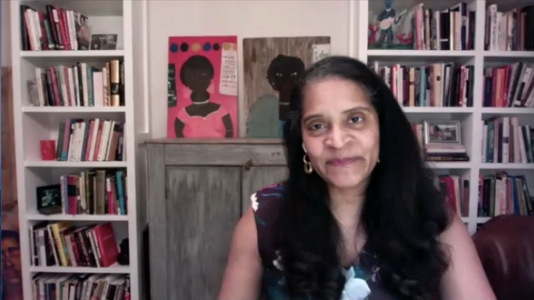Author Emily Bernard speaks at annual Stanley Stone lecture
Award-winning author and teacher Emily Bernard discussed the importance of teaching race, as well as the experiences that led her to write Black Is the Body: Stories from My Grandmother’s Time, My Mother’s Time, and Mine for the College of General Studies’ annual Stanley Stone Distinguished Lecture. The lecture was held virtually on March 11 to an audience of nearly 300 members of the CGS community.

Reflecting on the cruelty and rage of the world today, Bernard said she felt inspired to write something which would uphold vulnerability as a strength.
Black Is the Body, which tells of the history of both Bernard’s own ancestors and the African-American literary tradition, is told from the perspective of an imperfect being, who plans to keep learning for the rest of her life. According to Bernard, life’s stories begin in relation to one another, not the individual, making it clear that the first-person point of view in the book is not herself.
Bernard then introduced the theme of healing in both her lecture and in the book, when she told of her experience being hospitalized after being stabbed in a coffee shop. This experience also inspired the book because it taught her how to heal through writing and storytelling.
“I wrote Black Is the Body because I believe we can build bridges with our words and only walls with our silence,” she said.

Bernard’s works have appeared in O Magazine, Harper’s Magazine, The New Republic, Best American Essays, Best African-American Essays, Best of Creative Nonfiction, and thenewyorker.com. Her most recent work, Black Is the Body, has been named one of the best books of 2019 by Kirkus Reviews and National Public Radio and has won the 2019 Los Angeles Times Christopher Isherwood Prize for Autobiographical Prose. Today she is both a writer and the Julian Lindsay Green and Gold Professor of English at the University of Vermont.
Bernard discussed the first time her writing was able to embody her identity as both a writer and a teacher. The piece, “Teaching the N-Word,” allowed her to introduce uncomfortable subjects of race to a predominantly white class at the University of Vermont.
Once Bernard shared the piece with her students, she found that it had achieved its role as a story – to create transparency between individuals.
“We all have a relationship to language. We have a relationship to race. The essay is meant to be an invitation, and it’s also meant to be a democratic space where the reader and the writer come together,” she said.
Highlighting the interconnectedness of the stories of Black people, Bernard questioned the role of storytelling in the healing process of trauma. She ended the lecture with the conclusion that storytelling is vital to this process.
“I will continue bearing witness on the page and in the classroom to the suffering and triumphs of Black people. Because in fact, as I’ve learned from my ancestors, the salve is the telling itself,” she said.
— By Meghan Bohannon